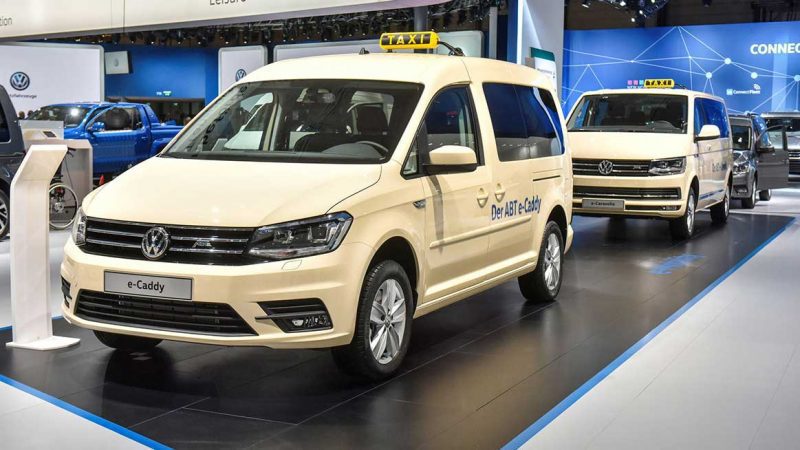VW has presented a fleet of all-electric and hydrogen-powered commercial vehicles at the IAA Commercial Vehicles in Hanover, that includes not only 4 types of e-vans for transport and cargo use, but even an electric cargo bike.
The new range spans the gamut of the light commercial vehicle market, offering solutions for long-haul routes, urban and last-mile delivery and even an option for the tradies.
VW Crafter HyMotion
Starting at the heavier end of the light delivery vehicle class is the hydrogen-fuelled Crafter HyMotion.
Currently in concept stage, this 3.5 tonne van carries a 4.2kg hydrogen tank and 13.1kWh li-ion battery that can travel a distance of 350km without refuelling, and is available with an optional larger tank for those needing a longer driving range of 500km.
According to VW, the Crafter HyMotion is nearing production stage – but that whether or not it reaches market is entirely dependent on analysis currently being conducted to determine if its production will be profitable.
I.D. BUZZ Cargo
Also in concept stage is the I.D. BUZZ cargo van concept – the working dog equivalent of the I.D. Buzz ‘electric Kombi’ that we told you about yesterday.
Similar in appearance to the I.D. BUZZ microbus, VW intends to fit out the cargo van version with specialised shelving for sparkies and technicians in mind, that can track and deliver items needed for jobs, that are stored on the shelves at the push of a button.
There is however a missed opportunity, with no mention of powerpoint – we imagine this would also be very useful for tradies (no prizes for guessing what this would be powered off).

ABT e-Caddy and e-Transporter
Joining the Crafter HyMotion and I.D BUZZ are the ABT e-Caddy and ABT e-Transporter.
These small delivery vans, designed for urban delivery in collaboration with strategic partner ABT, fill a prominent gap in the German automaker’s electrified commercial vehicle range.
The e-Caddy is the smaller of the two, with 4.2 m3 interior space and a top speed 120km/hr (somewhat faster than needed for urban delivery it must be said), comes with a 37.3kWh battery and 82kW electric motor and a range of up to 220km (NEDC).
The e-Transporter is the EV version of the eighty-year strong Transporter model, and in addition to the same 37.3kWh battyer of the e-Caddy has an optional version with a battery capacity of 74.6 kWh, giving a range of 200 or 400 kilometeres, according to the German automaker.
Electric drive retrofit solutions for the ABT range are slated to arrive on market in 2019.
Cargo e-Bike
The cargo e-bike , which is to be made available for sale in 2019, is designed for the last mile on the way to the customer, but could also be used in areas such as CBDs, factories or on hotel premises.
It’s by no means something to be zipped around in; the 250W electric motor offers a maximum speed of 25 km/hr.
Designed for a payload of up to 210 kg (including the driver), it is is equipped with two wheels at the front, supporting the low cargo area which fits a transport box with a storage capacity of 0.5 m³.
Tilting technology that VW have engineered for the front axle ensures that goods being transported on the loading area are always sure to stay stable.
All in all, VW’s new commercial EVs look to be very usable across a range of applications – and we will see them on Aussie shores from 2021 onwards.
As a spokesperson from VW Australia has told The Driven, “We see this sector as an important part of our local EV rollout and have already received great interest from our corporate customers.”

Bridie Schmidt is associate editor for The Driven, sister site of Renew Economy. She has been writing about electric vehicles since 2018, and has a keen interest in the role that zero-emissions transport has to play in sustainability. She has participated in podcasts such as Download This Show with Marc Fennell and Shirtloads of Science with Karl Kruszelnicki and is co-organiser of the Northern Rivers Electric Vehicle Forum. Bridie also owns a Tesla Model Y and has it available for hire on evee.com.au.




